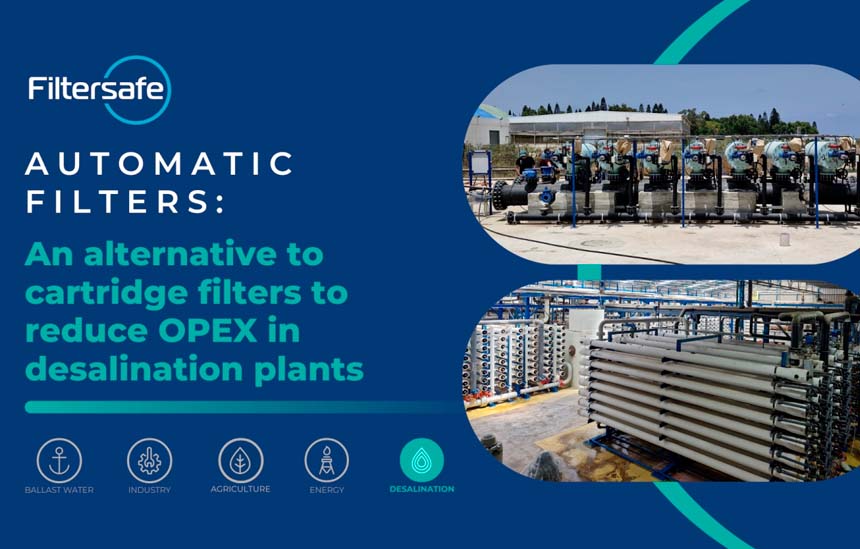Abstract:
Desalination is an invaluable solution for the global water crisis, particularly in arid regions. As the industry is already matured, there are few opportunities for new breakthrough technologies or cost-saving innovations. However, Filtersafe has found one such opportunity: replacing the cartridges that protect the RO membranes with automatic, self-cleaning filters. This article is a summary of the White Paper Filtersafe published on the research it conducted on the scientific viability and cost-saving claims discovered when a desalination plant uses automatic self-cleaning filters over the current industry standard of cartridge filters for RO membrane protection.
Protecting RO Membranes During Desalination
Reverse osmosis (RO) membranes are the heart of the desalination process, requiring protection from particulate matter and biofouling to maintain efficiency and longevity. Traditional methods involve multiple stages of filtration, including coarse filtration, ultrafiltration (UF), and multi-media filtration (MMF). Despite these stages, an additional filtration step is necessary to ensure the RO membranes are safeguarded from potential contaminants, as microscopic stray particles can puncture the membrane and jeopardize this critical stage in the desalination process.
A Critical Evaluation of Automatic Filtration Systems
Advanced pre-filtration systems utilizing automatic self-cleaning filters, such as those offered by Filtersafe, provide a compelling alternative to conventional cartridge filters. An automatic self-cleaning screen filter offers reliable and efficient filtration – down to 20 microns which offers comparable results to cartridges for RO membrane protection – with minimal energy consumption and maintenance costs, translating to significantly lower OPEX for desalination plants.
Comparative Analysis of Desalination Plant Filters
Traditional cartridge filters, often used for the final stage of pre-treatment in desalination plants, present several drawbacks. High energy consumption, frequent replacement needs, and substantial waste generation contribute to increased operating costs and environmental concerns. Filtersafe’s automatic filters address these issues by incorporating a self-cleaning mechanism that minimizes the need for manual intervention, dramatically reducing the labor cost associated with this phase of the desalination process, and ensures consistent filtration performance, ultimately lowering OPEX.
The Downsides of Cartridge Filters in Desalination
Cartridges need to be replaced frequently, as often as every 1-3 months, to ensure their efficient operation. As cartridges filter, they begin to clog, requiring higher energy expenditure to force the same amount of water through the increasingly less porous cartridge. Filtersafe’s automatic filters offer a significant reduction in energy consumption compared to traditional cartridge filters. By maintaining a low differential pressure (dP), these filters ensure minimal and consistently low energy use while effectively protecting RO membranes.
Alternatively, cartridges need to be changed frequently to prevent biofilm accumulation, which if it dislodges and makes its way downstream, can cause biofouling of the membranes and a costly replacement.
The Advantages of Horizontal Filters in Desalination Plants
Filtersafe’s horizontal filters are specifically designed for high flow rates while maintaining a compact footprint. This design makes them ideal for desalination plants, where space and efficiency are critical considerations. Their capacity to process large volumes of water (up to 5,000 m3/hr per unit depending on the desired degree of filtration) significantly enhances the plant’s overall operational capacity.
Optimizing Industrial Seawater Desalination RO Systems
Opportunities for new OPEX savings in desalination plants are far and few between. This new horizon for OPEX savings (via reduced energy costs, lower manpower, and removing the need to purchase and dispose of of cartridge filters) offers desalination plants a critical new way to reduce operational expenditures, making the plants a more worthwhile investment for municipalities looking to secure their water supply.
Filtersafe’s automatic filters eliminate also provide continuous, clean filtration with minimal need for manual intervention. This reduces labor costs and ensures uninterrupted plant operation, promoting both economic and operational efficiency.
Beyond Cost Savings: Environmental Considerations
The shift towards automatic self-cleaning filters represents a significant step forward in desalination technology, not just with regard to cost savings. These filters contribute to a more sustainable desalination process by eliminating the need for disposable cartridges. The OPEX and environmental savings are twofold – both removing the need to purchase cartridges, as well as not needing to deal with their frequent disposal, reducing waste generation and the carbon footprint of the plant.
Conclusion
Filtersafe’s automatic self-cleaning filters offer a compelling alternative to traditional cartridge filters in desalination plants. These advanced filtration systems significantly reduce energy consumption, labor costs, and waste generation, contributing to the overall efficiency and sustainability of desalination operations. As the demand for freshwater continues to grow, embracing such innovative technologies will be crucial for meeting future water needs in an environmentally responsible manner.
References
For further insights into the operational and economic benefits of automatic filters in desalination plants, consider reviewing Filtersafe’s white paper and case studies on the subject. These resources provide comprehensive data and real-world examples that highlight the transformative potential of these advanced filtration systems.

